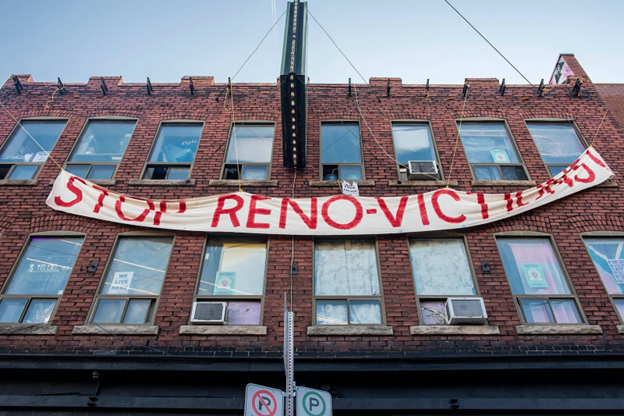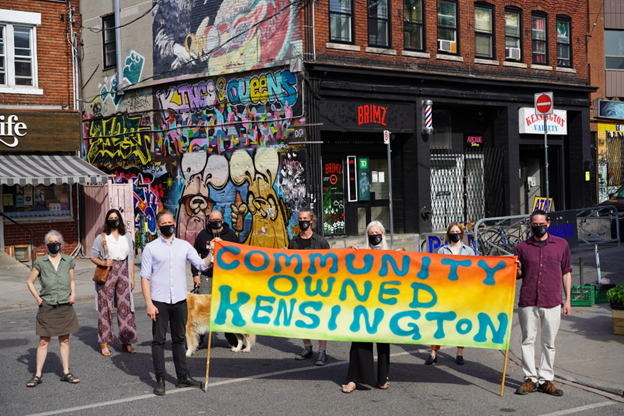In October 2021, Tapestry was selected to take part in a Canadian Mortgage and Housing Corporation (CMHC) program called the Housing Supply Challenge. This innovative competition encourages residents, interested parties, and experts from across the country to propose creative solutions to housing. The goal: to help meet Canada’s pressing need for safe and affordable homes by breaking down barriers to the creation of new supply.
Tapestry participated in Round 2 of the program, Getting Started, which seeks to find solutions to pre-development challenges, such as community resistance and obtaining financing. The program granted incubation funding to the 29 organizations selected to allow them to further develop and test their solution proposals.
Through six months of research and consultation, we had the opportunity to speak with over 40 interested parties in the affordable housing sector, from housing providers, to development consultants, to funders and lenders. Each and every individual and organization consulted helped to co-design our solution proposal.
In this blog series, “Financing Affordable Housing with the Power of Community”, we will be sharing the lessons learnt and stories heard from some of the amazing organizations that we have partnered with, including Kensington Market Community Land Trust, featured in this article.
Kensington Market is under tremendous economic and development pressure.
Renters are being pushed out of their homes, food sellers are losing their stores and diversity and affordability – the very soul of the Market – are under threat. The Kensington Market Community Land Trust (KMCLT) is a grassroots organization actively addressing this crisis. The land trust acquires and provides management of land, in perpetuity, removing properties from the pressures of the commercial real estate market.

We had the pleasure of sitting down with Chiyi Tam, the Executive Director of KMCLT, to learn more about the land trust’s goals and plans for acquiring properties. We got right into it when Chiyi began telling us the story of how KMCLT came to own their first property last year – with only a $75 balance in their bank account at the time and a $6.25 million ticket price on the building.
“It was truly amazing,” Chiyi shared, “as the story often does, it began with community organizing.” In 2018, tenants living in 54-56 Kensington, a 12-unit residential building, were unfairly threatened with illegal eviction. “It was very clear that the landlord’s intention was to convert the units into short-term rentals, and the only way to prevent this was to keep those tenants in place.”
The community activated quickly, and with the support of individual neighbours, the Friends of Kensington Market and Kensington-Bellwoods Community Legal Services, all tenants resisted the eviction attempt and remained in their units.

Two years later, the building came up for sale. With leadership from City Councilor Mike Layton, The City of Toronto stepped in with a $3 million forgivable loan, recognizing that if this building was purchased privately it would mean losing affordable housing units; and a down payment was made possible through a neighbour in the market that personally put up $300,000.
To complete the financing puzzle, KMCLT worked with a number of financial institutions, including Vancity Community Investment Bank, which Chiyi says played a critical role in mentoring them through the process, and Alterna, who came through with the mortgage. They also received a very last-minute 0% vendor take-back (VTB) mortgage for $250,000 to cover the remaining capital costs. “I was concerned about repaying the VTB through fundraising, but within a week of the news getting out, we had collected $12,000 in donations,” shared Chiyi.

With their first project under their belt, Chiyi shares that they are ready to take on a second project. “Neighbours and community members have been mapping property ownership and building types in our area, helping us identify acquisition targets and buildings at risk of private redevelopment. That’s our shopping list.” Chiyi shares with a smile.
Chiyi believes Community Bonds could be an important piece of their financing for acquiring new properties, or potentially developing a new mixed-use, mixed-income build in the pipeline. It is clear that what KMCLT is doing is resonating and there is widespread community support, not just in Kensington Market among residents and businesses, but across the entire city. “Everyone benefits from this amazing place and wants to maintain its eclectic, inclusive soul.”
Chiyi shared that there was much discussion among their Board about the direction of their future financing. “They understood the different risks and costs associated with pursuing a traditional charitable approach and taking on investment. I think this comes down to our overall financial literacy as an organization, and our core values about how we are held accountable by our members, donors, and investors.”
A key takeaway from our conversation is the power of connecting with like-minded organizations to learn through their experiences. Chiyi highlighted that the mentorship they received from the Parkdale Neighbourhood Land Trust in acquiring their first property was invaluable. “It was like group therapy for the anxiety of going through a commercial acquisition project,” says Chiyi with a sigh of relief that that chapter has closed. “I don’t think we could have done it without that direct transfer of knowledge and support.”
Chiyi hopes to be able to work with Tapestry and pilot the Community Bond model for other land trusts to be able to replicate in the future.
*Please note the ’Financing affordable housing with the power of community’ project received Incubation Funding under the Housing Supply Challenge – Getting Started Round, however, the views expressed are the personal views of the author and CMHC accepts no responsibility for them.
**Photos provided courtesy of Kensington Market Community Land Trust www.kmclt.ca

